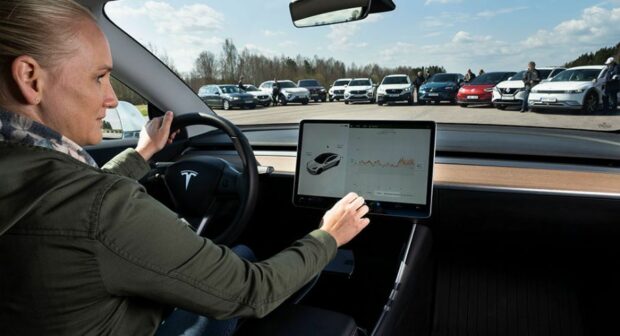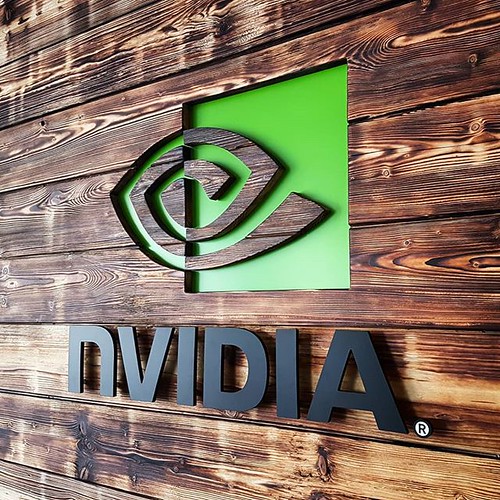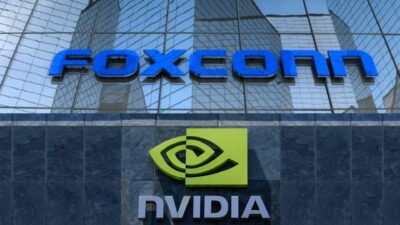While American autoworkers and their unions are still discussing opportunities for gas-powered vehicle manufacturing, the competitive landscape for EV production is quickly growing beyond traditional automakers.
Table of Contents[Hide][Show]
In a groundbreaking move, Foxconn and Nvidia have forged an alliance that promises to reshape the very landscape of automobile manufacturing. Foxconn, the world’s largest contract electronics manufacturer (they make the iPhone for Apple), and Nvidia, a pioneer in artificial intelligence (AI), have embarked on a new partnership to create AI data factories that promise to revolutionize the electric vehicle (EV) manufacturing industry.
Driven by a shared vision for the future of mobility, this partnership has the potential to establish AI data factories that will serve as nerve centers for the development and production of cutting-edge EVs.
This alliance marks a pivotal moment in the evolution of the automotive industry, as it paves the way for the establishment of AI data factories. These sophisticated facilities will serve as nerve centers for the development and deployment of intelligent EVs, capable of harnessing the immense power of AI to optimize performance, enhance safety, and deliver an unparalleled driving experience.
The Foxconn-Nvidia Partnership: A Symbiosis of Expertise
The Foxconn-Nvidia partnership is a strategic fusion of complementary strengths. Foxconn brings to the table its unparalleled expertise in manufacturing and supply chain management, while Nvidia contributes its cutting-edge AI hardware and software solutions. This potent combination creates a formidable force capable of realizing the full potential of AI in EV manufacturing.
AI data factories will serve as the cornerstone of this endeavor. These facilities will be equipped with Nvidia’s DGX systems, which are purpose-built for training and running AI models. Data collected from sensors embedded in EVs will be fed into these systems, enabling them to learn and improve over time.
As AI models are refined, they can be deployed back into EVs, resulting in continuous improvements in performance, safety, and efficiency. For example, AI can be used to optimize battery management, improve regenerative braking, and enhance autonomous driving capabilities.
The Implications for the EV Industry

The Foxconn-Nvidia partnership has far-reaching implications for the EV industry. By leveraging the power of AI, Foxconn and Nvidia are poised to establish themselves as leaders in the development and production of intelligent EVs.
This partnership is likely to accelerate the pace of innovation in the EV industry, as it will enable automakers to bring more advanced and sophisticated EVs to market more quickly. Additionally, the partnership could lead to the development of new business models, as automakers look to monetize the data generated by their EVs.
Foxconn and Nvidia Forge an AI-Powered Alliance: Ushering in a New Era of EV Manufacturing Share on XNvidia’s CEO Sparks Debate: Is Learning to Code No Longer Necessary?
In a surprising twist that’s sent shockwaves through the tech world, Nvidia‘s founder and CEO Jensen Huang has made a bold claim earlier this year that’s still leaving many in the tech industry scratching their heads. According to Huang, programmers shouldn’t bother learning how to code anymore. But before you toss out those programming books, let’s take a closer look at his comments.
Huang’s Controversial Stance Against Learning How To Write Code
At the February World Government Summit conference in Dubai, Huang dropped this bombshell: “Over the course of the last 10 years, 15 years, almost everybody who sits on a stage like this would tell you that it is vital that your children learn computer science. [That] everybody should learn how to program. And in fact, it’s almost exactly the opposite.”
The tech mogul went on to explain his vision: “It is our job to create computing technology such that nobody has to program and that the programming language is human. Everybody in the world is now a programmer. This is the miracle of artificial intelligence.”
At first glance, it sounds revolutionary. Who wouldn’t want to skip the grueling process of learning complex programming languages? But let’s pump the brakes for a second and consider the implications.
Nvidia’s AI Dependency Trap

While Huang’s vision of a world where everyone can program without actually coding sounds utopian, it’s important to read between the lines. This stance conveniently aligns with Nvidia’s business interests, potentially creating a dependency on their AI products.
“It is our job to create computing technology such that nobody has to program and that the programming language is human.” – Jensen Huang
As Enda Eames pointed out in a LinkedIn comment, “This is a somewhat self-congratulatory view by Nvidia’s Founder/CEO… who is in his role precisely because of his engineering and ‘programming’ skills. Like all the ‘tech’ founders, he’d prefer that everyone uses his ‘stuff’…which is otherwise called ‘dependency’.”
The Value of Coding Skills
Despite Huang’s claims, many in the tech industry argue that coding skills remain invaluable. One former programmer and business analyst emphasized that “without the core programming skills (that illuminate the why, how, where, what, when and who aspects of a project) any would-be ICT ‘problem solver’ is very under-resourced.”
Think of it this way: would you trust a doctor who only relied on AI diagnostics without understanding the underlying medical principles? Probably not. The same logic applies to programming.
Balancing AI and Human Skills
While leveraging AI skills is undoubtedly critical in today’s tech workplace, it’s not a replacement for human understanding. As another LinkedIn commenter noted, “People need to understand the output so that they could de-bottleneck it and make sure it runs correctly without unnecessary lines of code.”
Learning to code isn’t just about writing programs; it’s about developing critical thinking skills, problem-solving abilities, and a deep understanding of how technology works. These skills remain valuable even in an AI-driven world.
Should Young Programmers Learn How To Write Code?

While Huang’s vision of AI-powered programming is exciting, it’s premature to declare coding skills obsolete. As we navigate this AI revolution, it’s crucial to strike a balance between leveraging AI capabilities and maintaining human expertise.
So, before you decide to skip those coding classes, remember: understanding the fundamentals of programming might just be your ticket to thriving in the AI-driven future of tech. After all, who better to guide the AI than those who understand its inner workings?
Nvidia's Jensen Huang Claims Coding is Obsolete, But Is He Right? #coding #jensenhuang #nvidia #ai #programming Share on X[

Frank Wilson is a retired teacher with over 30 years of combined experience in the education, small business technology, and real estate business. He now blogs as a hobby and spends most days tinkering with old computers. Wilson is passionate about tech, enjoys fishing, and loves drinking beer.























 Pepper X: The Hottest Pepper in the World is Here to Set Your Taste Buds on Fire
Pepper X: The Hottest Pepper in the World is Here to Set Your Taste Buds on Fire
Leave a Reply
You must be logged in to post a comment.